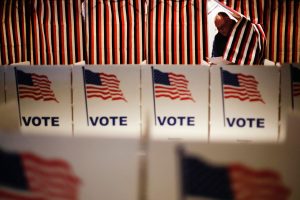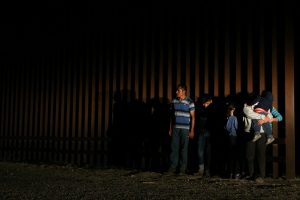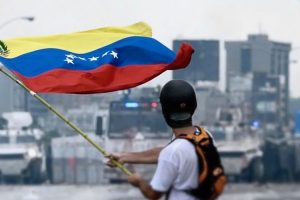Venezuela’s coalition of opposition parties held a symbolic plebiscite on Sunday, July 16, calling on voters to support or reject the government’s plan to rewrite the country’s constitution. The vote comes amid months of anti-government protests that have left at least 100 people dead.
The plebiscite will ask voters if they support President Nicolás Maduro’s plan to create a National Constituent Assembly tasked with writing the country’s 18-year old constitution.
http://gty.im/815534994
The non-binding plebiscite – or referendum – was organized by the opposition umbrella, the Democratic Unity Roundtable (MUD) and announced on July 3 by Julio Borges, president of the National Assembly.
The MUD has a majority in the National Assembly, holding 112 of the legislature’s 167 seats.
The constituent assembly election will be held on July 30, when voters will choose 527 delegates for the body. Maduro has said the delegates would be loyal to the Chavismo movement and “the old structures of political parties” would not be welcome.
Maduro would be permitted to remain president during the constituent assembly process, and opposition leaders say it could delay the planned 2018 presidential election.
Legality of the referendum
Borges announced the plebiscite on July 3 following its approval by the opposition-dominated National Assembly. In doing so, the opposition invoked Article 350, the final provision in the Venezuelan constitution that states: “The people of Venezuela, true to their republican tradition and their struggle for independence, peace and freedom, shall disown any regime, legislation or authority that violates democratic values, principles and guarantees, or encroaches upon human rights.”
La Dolorita dice Si al Futuro, Si a la democracia, Si al Cambio #HoyElPuebloDecide pic.twitter.com/7f3MqTOQLW
— Julio Borges (@JulioBorges) July 16, 2017
The National Electoral Council does not recognize Sunday’s plebiscite to be legally binding, and Maduro has denounced it, saying the opposition “intends to install a parallel, illegal, unconstitutional, improvised state.”
Lius Almagro, Secretary-General of the Organization of the American States, has backed the poll and said the planned constituent assembly “would entail the final dismantling of democracy” in the country.
Bolivian President Evo Morales said on Saturday that the referendum is an affront to the Venezuelan constitution promoted by people with a “coup attitude.”
The government is holding its own vote on Sunday, which it says is a test run for the National Constituent Assembly election.
What’s on the ballot?
- Do you reject and ignore the formation of a Constituent Assembly proposed by Nicolás Maduro, without the prior approval of the people of Venezuela? Yes/No
- Do you demand the National Armed Forces and all public officials obey and defend the Constitution of 1999, and support the decisions of the National Assembly? Yes or no? Yes/No
- Do you approve of the renewal of public powers in accordance with the provisions of the Constitution and the holding of free and transparent elections, as well as the formation of a government of national unity to restore constitutional order? Yes or no? Yes/No
Ease of voting
The MUD has set up more than 15,000 polling stations and will process votes along with around 50,000 volunteers and civil society groups, Univision reported. There are around 20 million registered voters in Venezuela, and people over age 18 can vote.
The opposition set up a website for Venezuelans both in the country and abroad find their polling stations. Stations have been set up in more than 80 countries for Venezuelans abroad.
Venezolanos votando en el Océano Índico en la Isla Reunión (Dpto. de ultramar francés) Estamos en todas partes! #HoyelPuebloDecide pic.twitter.com/nGAuN4u9wU
— María Corina Machado (@MariaCorinaYA) July 16, 2017



